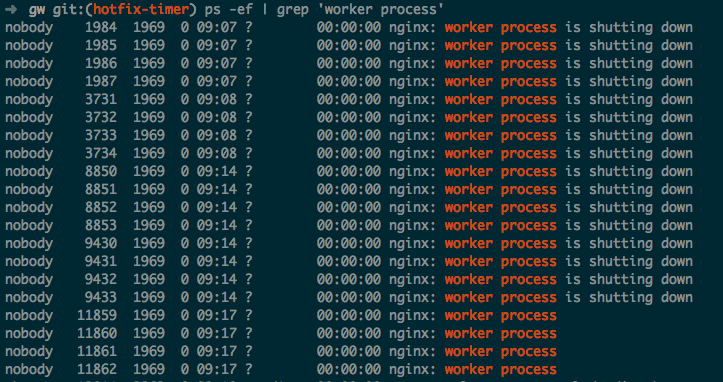昨天遇到一件诡异的事情,线上用作 gateway 的 openresty 引发了内存报警。这些 openresty 之前已经运行了 5 周左右的时间。开始还以为代码中或许有引发内存泄漏的 bug,但是仔细查看后。发现了如下的情况 (因为我是实习的碰不到生产环境,所以下面这个图是本地模拟的)

显示 is shutting down 的进程数目足足有 212 个(线上服务器只有 8G 内存)。
WTF,这些进程一直没有自杀,最长的从九月份活到了现在
由于这 gateway 是我写的,所以找 bug 的重任自然落到我的头上了(自食恶果)。一共也没多少代码,很容易地就将问题定位在了 reload 上。线上 reload 了一次,结果成功增加了一个进程(也就是说 5 周的时间发了 212 次代码,这是加特林么?没错,毕竟用的 gunnery)
只增加了一个进程,这个很关键。因为我们一共开启了 4 个 worker。换句话说,有一个进程是特殊的。那便是用来定时同步数据的 worker。大致代码如下:
if 0 == ngx.worker.id() then
local delay = 0
local handler = function (premature)
if premature then
return
end
-- 使用 ngx.sleep 替换了网络 IO 和 ngx.share.DICT 的读写
ngx.sleep(60)
local ok, err = ngx.timer.at(delay, handler)
if not ok then
ngx.log(ngx.ERR, "failed to create the timer: ", err)
return
end
end
-- 实际上同时运行了 3 个 timer,来执行不同的 cron job
local ok, err = ngx.timer.at(delay, handler)
if not ok then
ngx.log(ngx.ERR, "failed to create the timer: ", err)
return
end
end
好吧,可能有人会说这是什么烂代码(本人无法反对)。delay 是 0 啊,相当于 while true,算什么 cron job。实际上,之所以 delay 为 0 是因为那次请求是一个长连接,在 upstream 没有数据变动的时候,足足会在那里维持 4 分钟。问题在于根据文档所说,worker 即将退出时会将 callback 的第一个参数设置为一个退出原因(process exiting)的字符串,而我们的 premature 没起作用
接下来,便是漫长的 Google 时间。然而没什么卵用,只找到了个相似的 帖子,不过解决办法却适用(玄学?)
if ngx.worker.exiting() then
return
end
无奈之下,只能去翻看 openresty 的源代码了。其实这个问题很简单
static int
ngx_http_lua_ngx_timer_at(lua_State *L)
{
return ngx_http_lua_ngx_timer_helper(L, 0);
}
/*
* TODO: return a timer handler instead which can be passed to
* the ngx.timer.cancel method to cancel the timer.
*/
static int
ngx_http_lua_ngx_timer_every(lua_State *L)
{
return ngx_http_lua_ngx_timer_helper(L, 1);
}
static int
ngx_http_lua_ngx_timer_helper(lua_State *L, int every)
{
int nargs, co_ref;
u_char *p;
lua_State *vm; /* the main thread */
lua_State *co;
ngx_msec_t delay;
ngx_event_t *ev = NULL;
ngx_http_request_t *r;
ngx_connection_t *saved_c = NULL;
ngx_http_lua_ctx_t *ctx;
#if 0
ngx_http_connection_t *hc;
#endif
ngx_http_lua_timer_ctx_t *tctx = NULL;
ngx_http_lua_main_conf_t *lmcf;
#if 0
ngx_http_core_main_conf_t *cmcf;
#endif
nargs = lua_gettop(L);
if (nargs < 2) {
return luaL_error(L, "expecting at least 2 arguments but got %d",
nargs);
}
delay = (ngx_msec_t) (luaL_checknumber(L, 1) * 1000);
if (every && delay == 0) {
return luaL_error(L, "delay cannot be zero");
}
luaL_argcheck(L, lua_isfunction(L, 2) && !lua_iscfunction(L, 2), 2,
"Lua function expected");
r = ngx_http_lua_get_req(L);
if (r == NULL) {
return luaL_error(L, "no request");
}
ctx = ngx_http_get_module_ctx(r, ngx_http_lua_module);
/* look here */
if (ngx_exiting && delay > 0) {
lua_pushnil(L);
lua_pushliteral(L, "process exiting");
return 2;
}
ngx_exiting 为 true 且 delay 的值应当大于 0 才会起将 premature 设为 process exiting。而我们的 delay 一直是 0 !!!
解决方法:将 delay 更改为 0.001 即可
本来以为这貌似是个 bug,但是看了看这行代码的 commit 信息,觉得的确这样做是有道理的。delay 为 0 代表应当立即处理(实际上并不是立即),worker 本来就是要在处理完手头已有的任务才会退出
另外说一下 openresty 已经添加了 ngx.timer.every API(今年五月的时候),你再也不用这样写定时任务了。而且此 API 的 delay 参数当然也不能为 0